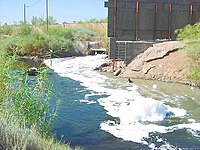
Photo from wikipedia
Abstract An international review of stormwater regulation and practices, especially for low-exposure, landscape irrigation schemes in urban environments, was undertaken with a view to identifying what could be used in… Click to show full abstract
Abstract An international review of stormwater regulation and practices, especially for low-exposure, landscape irrigation schemes in urban environments, was undertaken with a view to identifying what could be used in Alberta, Canada. A general lack of clear guidance and regulation to manage stormwater quality and potential public health risks was identified, which could be hindering the uptake of stormwater schemes generally. Particular data gaps and weaknesses identified include nominal and event performance of treatment barriers for the main acute hazards, enteric viruses and protozoa, which impacts on the ability to quantify risks and appropriately manage stormwater uses. Building on an interest to utilize stormwater for water-sensitive urban design and the Australian risk-management approach for water reuse, further guidance for the development of a risk-based regulatory approach to stormwater schemes is proposed. Using the principles of Water Safety Plans we propose a performance-based validation approach, involving the development of site-specific stormwater use management plans (SUMPs) that integrate monitoring and auditing protocols.
Journal Title: Sustainable Cities and Society
Year Published: 2017
Link to full text (if available)
Share on Social Media: Sign Up to like & get
recommendations!